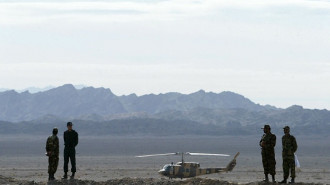UN 'may fail' to deliver Rohingya inquiry in Myanmar
The United Nations may not investigate allegations of war crimes and human rights atrocities against the Rohingya Muslim minority of Myanmar, according to the details of the latest draft resolution.
The UN Human Rights Council is currently discussing whether to set up an international inquiry, but the most recent resolution, drafted by the European Union (EU), falls short of an investigation.
The UN High Commissioner for Human Rights, Zeid Raad al-Hussein, denounced the "longstanding persecution" of the Rohingya minority in a speech on Wednesday and called for an inquiry.
"I therefore urge the Council, at minimum, to establish a commission of iquiry into the violence against the Rohingya, particularly during security operations since 9 October 2016," he said.
A potential investigation relies on a strong determination from the international community - something that may currently be missing, Reuters reports.
The current wording of the resolution cites "the very serious nature of the allegations" and "current investigations conducted at the domestic level".
Instead of a full inquiry, the resolution calls for the UN's special rapporteur on Myanmar, Yanghee Lee, to investigate "allegations of gross human rights violations by military and security forces" and try to "ensure full accountability for perpetrators".
Lee has previously been denied access to Rohingya villages due to "security issues".
A recent European Parliament motion on the plight of the Rohingya, urged the Burmese government to "urgently allow for [a] United Nations assisted investigation".
The motion also refers to "allegations that government security forces subsequently committed summary killings, sexual violence, arson, and other rights abuses against ethnic Rohingya villagers".
The European Commission provides around $100 million worth of aid to various aid projects supporting the Rohingya throughout South Asia.
The Rohingya Muslim population in Myanmar have faced continuous persecution from various groups, including the country's authoritarian military and other groups, for many years.
Myanmar nationalists view the Rohingya as illegal immigrants and many refer to them as Bengalis, due to their different ethnic background.
Hundreds of thousands of Muslims from the majority Rakhine state have had to flee state-sponsored violence and potential genocide as a result.

![Palestinians mourned the victims of an Israeli strike on Deir al-Balah [Getty]](/sites/default/files/styles/image_684x385/public/2024-11/GettyImages-2182362043.jpg?h=199d8c1f&itok=xSHZFbmc)


![The law could be enforced against teachers without prior notice [Getty]](/sites/default/files/styles/image_684x385/public/2178740715.jpeg?h=a5f2f23a&itok=hnqrCS4x)
 Follow the Middle East's top stories in English at The New Arab on Google News
Follow the Middle East's top stories in English at The New Arab on Google News
![Fakhrizadeh [AFP] Fakhrizadeh [AFP]](/sites/default/files/styles/image_330x185/public/media/images/774C39F7-8F7A-4D67-B998-27D102FCB4A7.png?h=d1cb525d&itok=j9eGvunV)

